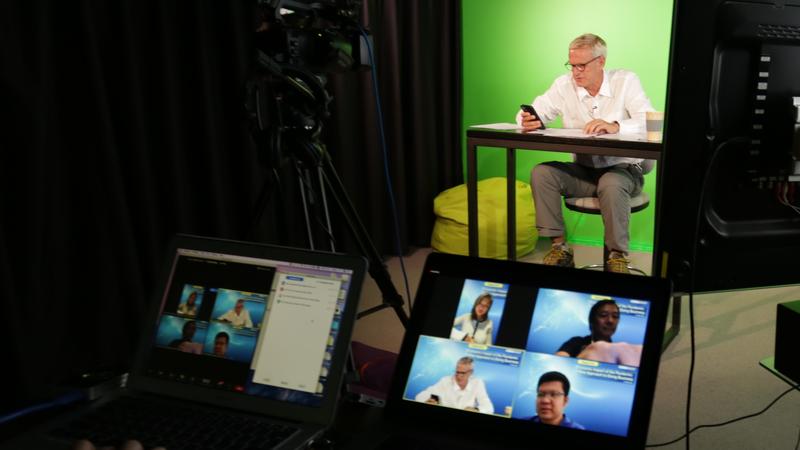Economic rebound 'relies on global cooperation'


Global cooperation in combating the coronavirus pandemic is key to achieving a "full, sustainable and quality" economic recovery, while businesses reeling from the disruption of supply chains and shrinking demand should upgrade their mindset and adapt themselves to the new economic environment, industry leaders and experts told the China Daily Asia Leadership Roundtable in Hong Kong on Wednesday.
Addressing a webinar panel themed "Economic Impact of the Pandemic: A New Approach of Doing Business", Xiao Geng, president of the Hong Kong Institution for International Finance, stressed the importance of international cooperation in fighting the virus to ensure economic recovery.
"Global economic recovery depends on how the world can work together to contain the coronavirus," he said. "Without firmly containing the pandemic, it's very difficult to have a full, sustainable and quality recovery."
In particular, China and the United States, as the world's two largest economies, have to work together. "People from both countries need each other. ... Sooner or later, the two countries have only one way (to go) — cooperation — because, otherwise, the cost will be so big, not just for both sides, but for the whole world," Xiao said.
Noting that nations are closely linked economically, he warned that geopolitical tension could be "the biggest risk" for the world economy.
"What's really important is geopolitical tension, which could lead to some kind of decoupling in supply chains. That's something that could last quite a few years or even decades," said Xiao, adding that enterprises need to think about how to deal with potential changes in the global economic and trade systems.
While many businesses are struggling to weather the economic storm brought by the unprecedented public health crisis, others are seizing the opportunity to push ahead with innovations and changes they believe will help them become even stronger after the pandemic.
Tim Lee, founder and chief executive officer of mobile payment service QFPay, said he sees new business for his company, as travel restrictions imposed by the government have forced people to stay at home, thus promoting e-commerce and mobile payment methods.
Online businesses will become the new normal after the pandemic, with more money and resources being processed through online channels, and the adoption of mobile payment methods will become faster, he reckoned.
Lee predicted that the pandemic will push mobile payment related industries and digital businesses to develop at least three years faster. "It's really a good opportunity for all of us and also our clients to upgrade their mindset and prepare for the future," he said. "If we take this chance to go digital, to go online, I think who survives will find they're even in a better position than before the COVID-19 (pandemic)."
Dennis Ng, founder and chief executive officer of Mober Technology, told the panel his company is a same-day on-demand delivery solution provider in the Philippines.
He said that when he founded the enterprise in 2016, there were so many unbanked delivery drivers in the country, meaning they don't even have a bank account. So, Mober has to focus on helping these drivers to own their vans, by paying daily rentals as installments and, after three to four years, the vehicles will belong to them.
Manila, the capital city of the Philippines, has been under lockdown due to the pandemic since March, and Ng sees the situation as an opportunity for his company to restructure and improve its services.
"So what we did was to team up with big shopping malls in the Philippines because they've all been hit by the pandemic and unable to operate. We told them to use their store fronts as fulfillment centers, and we can create community delivery with a better rate," Ng said.
With Manila still in lockdown, Ng believes that even after the pandemic is brought under control and the city reopens, many people will continue to practice social distancing. That means there'll be long queues in front of every shopping mall.
He said the best solution is for the malls continue allocating some areas as fulfillment centers, as they're are all located near communities, unlike warehouses and logistic centers. It'll make more sense for them to continue working together with companies like Mober in future to deliver goods directly from malls to people's doorsteps.
Edith Yeung, general partner of Race Capital, a venture capital and private equity firm, said her company is looking at enterprises not just for whom they're now, but what they could be in 10 years' time.
She reckoned that the pandemic is a black swan crisis not just for this year, but for the entire decade. "But, I've always been saying the worst time is also the best time for some companies — those that are most adaptable will survive."
Yeung's suggestions for companies to pitch for venture capital investment include: Firstly, to get used to online meetings with potential investors, put on a nice shirt and be professional. Secondly, some Chinese entrepreneurs tend to jump directly into introducing their products, while investors are actually more interested in the founder or the chief executive's view about the macroeconomy — how they see the industry and what do they know about their competitors. Lastly, they've to be well prepared and do the "homework".
All these proposals could help enterprises land the investment they desperately need in this tough environment.
Yeung also said she believes that companies engaged in the pharmaceutical, biotech, cyber security and online education industries will outperform amid the pandemic. But, for those in the sharing economy, travel and other offline, experience-dependent areas, it'll be difficult.
- Beijing accelerates renovation of old residential buildings
- Guangzhou optimizes rail services for 15th National Games, Paralympics
- New sci-tech innovation platforms launched in Xinjiang
- Thai students document Wuhan life in photo contest
- Basha Miao village glows in early winter's embrace
- Fengxian achieves leapfrog economic growth through new drivers





































